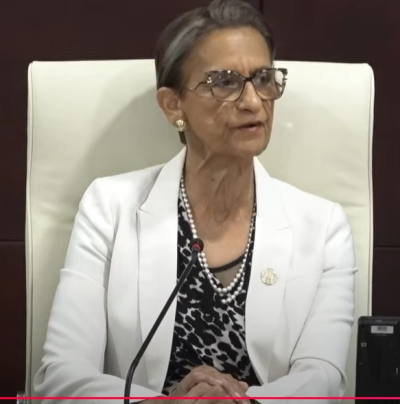~Case of “Great Bay Development” Seen as Prototype for New Incentive Framework. ~
 PHILIPSBURG:--- Member of Parliament Sarah A. Wescot-Williams has formally written to the Minister of Finance and the Minister of Tourism, Economic Affairs, Transport and Telecommunication, raising a series of questions and recommendations regarding Sint Maarten’s tax holiday legislation and the broader system of fiscal incentives.
PHILIPSBURG:--- Member of Parliament Sarah A. Wescot-Williams has formally written to the Minister of Finance and the Minister of Tourism, Economic Affairs, Transport and Telecommunication, raising a series of questions and recommendations regarding Sint Maarten’s tax holiday legislation and the broader system of fiscal incentives.
The MP notes that the matter of so-called tax holidays has long been under scrutiny, both in Parliament and in the public domain. “Recent questions by a colleague member of Parliament again highlight the need for clarity and transparency in how these tax incentives are applied,” Wescot-Williams stated.
In her letter, Wescot-Williams references responses given to Parliament in 2023 by the then Minister of Finance concerning the disclosure of tax-holiday information. She asks whether the current Ministers share the same view regarding disclosure to Parliament and transparency in these matters.
The MP further points out that documents and presentations to Parliament on tax reform to date suggest the abolition of existing tax holiday legislation. “If this is indeed the Government’s position, it should be clearly stated. If not, the Government should outline its view on the continued existence or reform of this legislation,” she wrote.
Wescot-Williams also referenced a 2019 announcement by the former Minister of Finance that an amendment to the incentive framework was being prepared, asking what became of that initiative.
The MP highlighted the 2018 tax holiday granted to the developer of the “Great Bay” property, noting that an extension was later given by Ministerial Decree in 2020. She questions whether the required investment criteria were met, whether there was a measurable economic justification, and whether the subsequent decree was validly tied to the original 2018 decree.
“These questions go to the heart of how fiscal incentives are granted, monitored, and enforced,” the MP emphasized.
Pending answers, Wescot-Williams proposes using this case as a test model for a reformed, modernized incentive framework. Her recommendations to Government include:
Establishing a Policy Review using the Great Bay case as a pilot to test post-grant auditing and compliance tools;
Introducing clear criteria for future incentive requests, including economic and environmental impact assessments;
Embedding revocation clauses to withdraw benefits in cases of non-compliance;
Separating CSR (corporate social responsibility) initiatives from tax incentives; and
Publishing approved incentive projects and results, taking a look at Curaçao’s 2024 “revision and repair” Ordinance.
“Although the Great Bay case may be considered procedurally closed, it offers a timely opportunity for Sint Maarten to demonstrate proactive governance and fiscal responsibility,” Wescot-Williams stated. “By testing new evaluation tools and transparency measures on this case, the Government can set a regional benchmark in sound economic management and accountability.”
She concluded that this initiative, if pursued promptly, could position Sint Maarten as a regional leader in transparent and responsible investment policy.